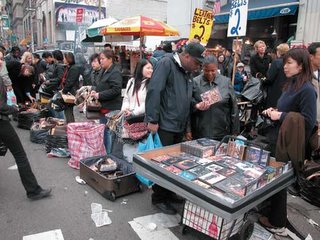By George Ziemann 10/14/03
There is something that I find incredibly mystifying about the entire chain of events from Napster to the present. This entire scenario has played out before.
Which makes it all the more curious why the RIAA is following it step by step. In today's news, we learn that the RIAA has now advanced to using strongarm, mob-style tactics by conducting warrantless search-and-seize missions against independent music stores who dare to sell music that the RIAA doesn't own.
On September 23, Berry's Music in Indianapolis, Indiana, was raided:
"According to proprietor Alan Berry, police confiscated $10,000 worth of mix discs by the likes of DJ World and DJ Paul Bunyan.
 'The record labels want the independent record stores out of the business,' Berry says. 'They'd rather deal with Target, Best Buy, Circuit City -- it's consolidation, just like any other industry. The RIAA knows that mixes are an integral part of urban stores' culture and profit margin. By eliminating them, they can eliminate a lot of indie stores'."
'The record labels want the independent record stores out of the business,' Berry says. 'They'd rather deal with Target, Best Buy, Circuit City -- it's consolidation, just like any other industry. The RIAA knows that mixes are an integral part of urban stores' culture and profit margin. By eliminating them, they can eliminate a lot of indie stores'."City Music, also in Indianapolis, was raided on October 1, with manager Jerome Avery quoted as saying, "They came in and took anything that was on a recordable CD. The only DJ mixes I had were behind the counter for personal listening, and they confiscated them. How can it be illegal if the artist is making them for the street? They came without a notice - no warrant, no nothing. They're making up their own laws, if you ask me."
The City Music raid happened the day Universal's new prices went into effect - "more bad news for small, independent record stores. Universal's widely publicized $9.09 wholesale prices only apply to the largest retail chains, and only to stores that are willing to buy 30 copies of a disc at one time. Most smaller stores, though, deal with 'one-stop' sub-distributors that can fill orders for a disc or two quickly, and take a markup of their own. And many retailers are frustrated that customers have been coming in for weeks, asking where their $9 CDs are.
Eric Haight of Record World in Petoskey, Michigan, notes that a new Sting album before the price drop cost the store $12.69, with a suggested retail price of $18.98. Now it costs them $10.79, with a retail price of $12.98 - the profit margin has been slashed by almost two-thirds, and Universal will no longer help them out with advertising costs.
After watching the RIAA's public Dance of Death closely for only about a year, everything they do is so predictable that I'm beginning to wonder if they even have any control over their own destiny. For some inexplicable reason, they seem compelled to follow through until the final scene, perhaps unaware that there's been a rewrite in the ending over the last 90 years.
While suggested reading is the series I did earlier on Thomas Edison, here is a synopsis of how Edison's approach to running an entertainment industry so closely parallels what the RIAA is trying to do.
After all, the goal is the same -- to maintain a monopoly.
Step 1 -- Acquire the rights. All of them.
In Edison's case, patents were the prize possession. His realm was the movie industry. Edison, or those who worked for him, had basically invented the entire movie industry, along with all the pieces and parts that made it happen. The RIAA uses copyrights in the same manner by gathering all the industry's top players, thus creating a collective ownership base to wield the same power.
Step 2 -- Define the standards
Once you own all of the rights, you have to find a way to make competing prohibitively expensive. This requires defining the standard to include some proprietary part, method, equipment, etc. Edison's means of achieving this goal was with the film size and even the spacing of the little holes along the edges, still Kodak's standard.
For decades, the vinyl record served this purpose for the music industry. It was a capability that required special equipment, preventing your average person on the street from being able to replicate the product or compete with it. For this very reason, the electronics industry owns a great deal of the recording industry today. Sony is the best example.
Step 3 -- Dominate the market
The easiest way to dominate the market is by being the only game in town. The second easiest way is to get together with the top competitors and come up with a market strategy that everyone can play by. Both methods carry the likelihood of being looked at as anti-competitive, depending how the parties involved act. The public and the government will actually tolerate a benevolent monopoly for quite some time if no one complains about it. Major league baseball is a perfect example -- there's no such thing as an independent major league baseball team, at least not that I've ever heard of. Even if there are, they're certainly not going to make it into the World Series. The public doesn't complain because all the teams are apparently subject to the same rules. No team "wins" just because they have the richest owner.
And we know the players get paid.
So it has been with radio airplay, the preferred method of choice for selling music for decades. The hypothesis is that a person must hear a song several times in order to entice them to buy the record. Pretty simple. Very effective. The barrier to entry is very high, basically keeping competition limited to the major labels.
We now know that the players in this game are not being paid.
Step 4 -- Assume the creative community is expendable
Edison's mistake was that he felt that it did not matter who the performers were. It was the movie, the finished product, that was important, not the people in it. The general public was unfortunately not aware of this importance, preferring to follow their favorite stars. Edison underestimated the value of his performers and they abandoned him.
The recording industry has always been a bit more blatant in their cold-hearted willingness to discard performers. Edison simply was wrong in his assessment; the music industry is intentionally bent to minimize an artist's financial benefit, while constantly portraying themselves as acting in the best interests of the artists.
At least Edison was honest.
Step 5 -- Eliminate independent competition
In both cases, had Step Four not taken place, there would be no Step 5. As in the case of baseball, benevolent market domination can be tolerated by the public for extended periods of time.
The recording industry had a lock on the business until the advent of the CD, followed by the recordable CD. Expensive at first, but now significantly dwindled in price, the recordable CD and computerized audio mastering tools like Sonar, ProTools and Cakewalk have put professional audio capability into the hands of almost anyone.
The kid down the street now has the capability of making a CD that sounds as good as one from Warner Music. Whether he succeeds or not is another issue. The fact is that he's got the capability. If he puts a few mp3 files on the Internet, it's entirely possible that he can sell some CDs of his own music at a reasonable price. So, to make this scenario as difficult as possible to achieve, the industry has systematically painted recordable media, the Internet and mp3 files as contraband, its users as thieves and any artist not signed with a major label as illegitimate.
Add to this the strong-arm tactics now raised by the Village Voice, and the pattern of systematically elimination independent competition is almost identical to those methods used by the Motion Picture Patents Company 95 years ago.
Step 6 -- Alienate the public
Edison did his best to squash his competitors, but he never stooped so low as to try suing moviegoers for attending "unlicensed" movies. Step 6 is an RIAA original, I believe. For the life of me, I cannot comprehend why anyone ever thought this was a good idea on any level.
Now we see that they had intended to combat falling sales by a $4 price hike.
Step 7 -- Government intervention
The government allowed the Motion Picture Patents Company, which had been formed in December, 1908, to get away with their anti-competitive control over the industry for less than four years. The U.S. government brought an antitrust suit against the MPPC in 1912 and declared it illegal in 1915.
Considering that the government has a) been trying to diffuse the voice of the music industry for a half century, if not silence it altogether and b) four of the five major labels are foreign-owned, sooner or later someone at the top end of government is going to possess the lucidity to wonder why the government should even care what happens to the record industry.
The only real issue is how long we have to wait. Step 8 should be worth waiting for -- the same independent renaissance that filmmakers enjoyed in the 1920s and 30s when Edison's movie empire fell apart. But the indie filmmakers didn't even wait for the government. They simply walked away and started over.
Kind of like what's happening now.
©2002 George Ziemann
All material on azoz.com is protected by copyright law and by international treaties, but it all seems rather pointless.
You may reprint any article on this site in whole, in part, in effigy or in ridicule.
I really don't care.



